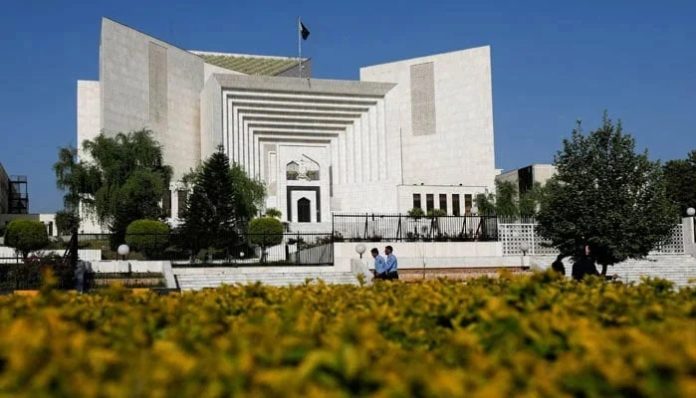ISLAMABAD: The Supreme Court (SC) Thursday suspended the Lahore High Court’s decision forming additional election tribunals as well as the Election Commission of Pakistan’s (ECP) April 26 notification.
The apex court’s decision came as a five-member bench heard the ECP’s plea against LHC’s last month’s verdict constituting eight election tribunals for hearing election petitions regarding national and provincial assembly constituencies.
The bench was headed by Chief Justice of Pakistan Justice Qazi Faez Isa and comprised Justice Amin-ud-Din Khan, Justice Jamal Khan Mandokhel, Justice Naeem Akhtar Afghan, and Justice Aqeel Ahmed Abbasi.
Today’s SC verdict is the latest link in the ongoing row between the ECP and the LHC regarding the appointment of judges in election tribunals regarding the February 8 polls.
The electoral body had moved the SC under Article 185(3) of the Constitution contending that under Article 219 read with Article 222(b) of the Constitution the power to appoint election tribunals was vested in the electoral body which could not be exercised by the high court.
The ECP had further contended that Article 219 of the constitution did not expressly require consultation by the commission with the chief justice of the high court concerned for appointing election tribunals or for allocating territorial jurisdiction to such election tribunals.
Section 140(3) of the Elections Act 2017 only required consultation with the chief justice of the high court concerned on the appointment of sitting high court judges as election tribunals, but this consultation did not cover the allocation of territorial jurisdiction to the election tribunals which was the sole power and prerogative of the ECP, as was evident from Section 140(1) read with Section 151 of the Elections Act 2017, the plea argued.
During today’s hearing, Justice Mandokhail remarked that the electoral body cannot dictate and demand the LHC CJ regarding the availability of handpick judges.
“You [ECP] cannot choose between the judges,” the judge said.
Meanwhile, CJP Isa remarked that LHC CJ was the one who could’ve decided on the availability of judges for election tribunals.
In today’s verdict, the court lamented the lack of communication between the electoral body and the LHC and remarked that the two judges notified by the ECP, in response to the six nominated by the LHC CJ, were “insufficient”.
Stressing that the issue arose after the LHC created additional tribunals, the SC decided to keep the said case pending before the court and left the matter to the consultation between the ECP and the LHC chief justice.
Directing the LHC and the electoral body to consult each other on the issue, the court then adjourned the case till meaningful consultations are held on the said matter.
ECP at odds with LHC
The issue arose first when the ECP, on February 14, had sought a panel of serving judges from the LHC for election tribunals.
The LHC chief justice then nominated two judges on February 20 which was followed by the nomination of another six judges by the CJ on April 14.
Out of these six nominated judges, two were notified by the ECP on April 26. However, the electoral body then additional names for the appointment to Rawalpindi and Bahawalpur election tribunals.
This, however, was denied by the LHC chief justice with the high court’s registrar calling on the electoral body to notify the election tribunals consisting of the judges nominated by the CJ.
The electoral body, while refusing to accede to the high court’s registrar’s demand, said that if it went through with notifying the election tribunals it would mean that they were in fact solely appointed by the LHC CJ and not as a result of consultations between the ECP and the chief justice — which essentially would be a violation of Section 140(3) of the Elections Act.
LHC CJ Justice Malik Shahzad Ahmad then constituted eight election tribunals for hearing cases related to the February 8 polls — a move which was then challenged by the ECP in the apex court.

















